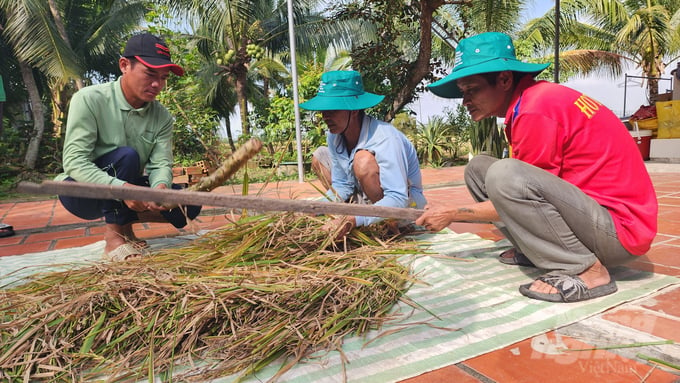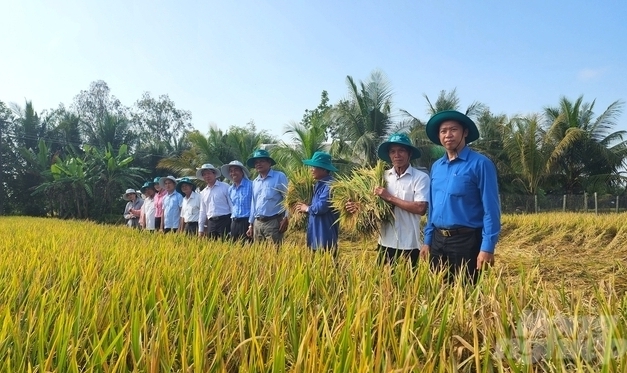November 25, 2025 | 16:34 GMT +7
November 25, 2025 | 16:34 GMT +7
Hotline: 0913.378.918
November 25, 2025 | 16:34 GMT +7
Hotline: 0913.378.918
Recently, the Department of Crop Production (MARD), in collaboration with the International Rice Research Institute (IRRI), organized to acknowledge the comments of representatives of 12 provinces and cities in the Mekong Delta (except for Ben Tre province) on the design and conduct a survey of 10,000 rice farmers on farming practices, profits - costs, farmers' awareness of climate change and greenhouse gas emissions... to build a rice production dataset of the Mekong Delta.

Department of Crop Production cooperated with IRRI to survey 10,000 Mekong Delta farmers to develop rice production data, especially for the Project of 1 million hectares of high-quality rice. Photo: Kim Anh.
According to Dinh Thi Kim Dung, Chief of the IRRI Office, this data set will calculate and compare production efficiency and rice value for the areas participating in the Project of 1 million hectares of high-quality rice.
Improving the efficiency of rice production in association with reducing greenhouse gas emissions is an urgent requirement for the Mekong Delta region to adapt to climate change and improve farmers' incomes. In recent years, rice production in the area has achieved many outstanding achievements, helping to firmly ensure national food security and contribute to providing a large amount of rice for export and generating foreign currency revenue for the country.
However, the income of most farmers is still low, and rice production in the region is also increasingly facing many adverse production conditions due to climate change, rising input prices, and increasing more demanding for product quality. Therefore, developing a regional rice production dataset is necessary to update and provide information for farmers and management agencies to direct, operate and adjust suitable production to meet development requirements.
The construction of the rice production data set must ensure the target and unify the data on the current farming methods, production costs, and profits. At the same time, assess the level of knowledge and awareness of farmers about climate change and pests, the level of participation in rice production of women, and differences in farming habits, especially understanding and awareness of ethnic minority farmers in 12 provinces in the Mekong Delta participating in the Project of 1 million hectares of high-quality rice.
This is also an opportunity to strengthen the capacity of agricultural staff to use digital tools to collect data from farmers, contributing to digital transformation in agriculture. Through the survey activities, it will provide a more scientific and practical basis for the process of developing the rice production data set in the Mekong Delta.
Through consultation, the localities contributed ideas on the questionnaire and the information to be collected about the rice production system following the actual situation in the locality. At the same time, determine the location and time of the survey in each province. In addition, IRRI will introduce survey software to serve the data collection process in the area.

The survey is an opportunity to strengthen the capacity of agricultural staff to use digital tools to collect data from farmers. Photo: Kim Anh.
According to Le Thanh Tung, Deputy Director of the Department of Crop Production, after this consultation, the Department of Crop Production will issue an official dispatch on the implementation plan to build a dataset of rice production in the Mekong Delta.
In addition, the contents exchanged and discussed will be sent by the Department of Crop Production to the Departments of Agriculture and Rural Development of provinces and cities to advise local leaders.
The Department of Crop Production and IRRI, in collaboration with partners in the Mekong Delta region, is implementing three CGIAR initiatives, including the AMD initiative to protect food systems in the great delta regions of Asia, the EiA initiative on agricultural excellence and the PHI initiative on plant health.
The main objective of these initiatives is a delta production system that is resilient to climate change. At the same time, it increases farmers' output and income by improving input materials' efficiency. Minimize damage caused by pests and diseases to critical crops, including rice. Finally, it aims to increase livelihoods and adaptability to climate change for smallholder farmers, especially women, young people, or belong to ethnic minority areas.
The survey will be conducted from August 2023 to the first quarter of 2024, divided into several phases. After the first survey, the Department of Crop Production and IRRI will conduct a preliminary review to evaluate and adjust, thereby promoting the effective implementation of subsequent surveys.
After the survey process is over, the Department of Crop Production and IRRI will review, evaluate and validate the results of contributions to the Project of 1 million hectares of high-quality rice.
Translated by Tu Quyen
/2025/11/24/3536-2-112800_176.jpg)
(VAN) Dong Nai now has tens of thousands of hectares of forests certified for sustainable management, and this area will continue to be expanded in the coming period.

(VAN) Vinh Ha hamlet (Dai Xuyen commune, Hanoi) is shifting away from small-scale farming as households adopt bioscurity into their breeder chicken models.

(VAN) Heavy rains make aquatic species more vulnerable to disease. Proactive water management and high-tech systems help farmers prevent outbreaks and protect yields.

(VAN) Greenhouses are shifting production mindsets in Binh Lu commune, enabling farmers to ‘weather the sun and rain’ and secure stable vegetable harvests throughout the year.

(VAN) Green transition is crucial for the Mekong Delta amid climate change and stricter standards, offering a path toward sustainability.

(VAN) Dong Thap promotes agricultural restructuring, forms large specialized farming zones, raises the value of agricultural products and develops toward ecological and high-tech directions.
/2025/11/22/4018-4-213342_747.jpg)
(VAN) The Mekong Delta Agricultural Experts Club has attracted 143 experts and researchers to participate in providing consultancy and contributing initiatives to the development of one million hectares of high-quality rice.